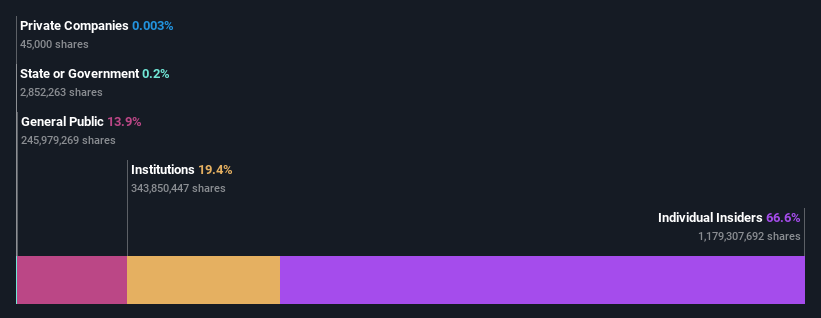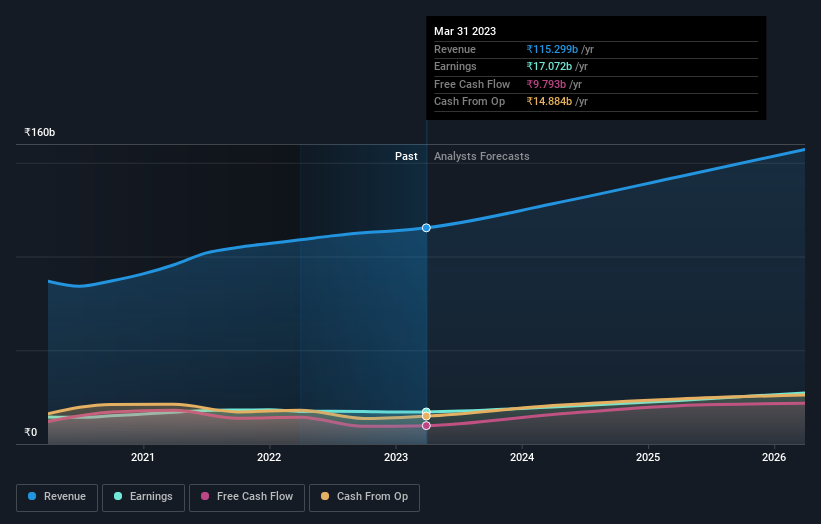- India
- /
- Personal Products
- /
- NSEI:DABUR
Insiders the biggest winners as Dabur India Limited's (NSE:DABUR) market cap rises to ₹961b

Key Insights
- Insiders appear to have a vested interest in Dabur India's growth, as seen by their sizeable ownership
- A total of 4 investors have a majority stake in the company with 52% ownership
- Institutional ownership in Dabur India is 19%
If you want to know who really controls Dabur India Limited (NSE:DABUR), then you'll have to look at the makeup of its share registry. We can see that individual insiders own the lion's share in the company with 67% ownership. That is, the group stands to benefit the most if the stock rises (or lose the most if there is a downturn).
As a result, insiders scored the highest last week as the company hit ₹961b market cap following a 4.4% gain in the stock.
Let's take a closer look to see what the different types of shareholders can tell us about Dabur India.
Check out our latest analysis for Dabur India

What Does The Institutional Ownership Tell Us About Dabur India?
Institutions typically measure themselves against a benchmark when reporting to their own investors, so they often become more enthusiastic about a stock once it's included in a major index. We would expect most companies to have some institutions on the register, especially if they are growing.
Dabur India already has institutions on the share registry. Indeed, they own a respectable stake in the company. This can indicate that the company has a certain degree of credibility in the investment community. However, it is best to be wary of relying on the supposed validation that comes with institutional investors. They too, get it wrong sometimes. It is not uncommon to see a big share price drop if two large institutional investors try to sell out of a stock at the same time. So it is worth checking the past earnings trajectory of Dabur India, (below). Of course, keep in mind that there are other factors to consider, too.

We note that hedge funds don't have a meaningful investment in Dabur India. Our data shows that Anand Burman is the largest shareholder with 17% of shares outstanding. For context, the second largest shareholder holds about 12% of the shares outstanding, followed by an ownership of 12% by the third-largest shareholder. Saket Burman, who is the third-largest shareholder, also happens to hold the title of Vice Chairman.
To make our study more interesting, we found that the top 4 shareholders control more than half of the company which implies that this group has considerable sway over the company's decision-making.
Researching institutional ownership is a good way to gauge and filter a stock's expected performance. The same can be achieved by studying analyst sentiments. There are plenty of analysts covering the stock, so it might be worth seeing what they are forecasting, too.
Insider Ownership Of Dabur India
The definition of an insider can differ slightly between different countries, but members of the board of directors always count. Management ultimately answers to the board. However, it is not uncommon for managers to be executive board members, especially if they are a founder or the CEO.
Most consider insider ownership a positive because it can indicate the board is well aligned with other shareholders. However, on some occasions too much power is concentrated within this group.
Our information suggests that insiders own more than half of Dabur India Limited. This gives them effective control of the company. That means insiders have a very meaningful ₹639b stake in this ₹961b business. Most would be pleased to see the board is investing alongside them. You may wish to discover if they have been buying or selling.
General Public Ownership
The general public-- including retail investors -- own 14% stake in the company, and hence can't easily be ignored. While this group can't necessarily call the shots, it can certainly have a real influence on how the company is run.
Next Steps:
It's always worth thinking about the different groups who own shares in a company. But to understand Dabur India better, we need to consider many other factors. Be aware that Dabur India is showing 1 warning sign in our investment analysis , you should know about...
Ultimately the future is most important. You can access this free report on analyst forecasts for the company.
NB: Figures in this article are calculated using data from the last twelve months, which refer to the 12-month period ending on the last date of the month the financial statement is dated. This may not be consistent with full year annual report figures.
If you're looking to trade Dabur India, open an account with the lowest-cost platform trusted by professionals, Interactive Brokers.
With clients in over 200 countries and territories, and access to 160 markets, IBKR lets you trade stocks, options, futures, forex, bonds and funds from a single integrated account.
Enjoy no hidden fees, no account minimums, and FX conversion rates as low as 0.03%, far better than what most brokers offer.
Sponsored ContentNew: Manage All Your Stock Portfolios in One Place
We've created the ultimate portfolio companion for stock investors, and it's free.
• Connect an unlimited number of Portfolios and see your total in one currency
• Be alerted to new Warning Signs or Risks via email or mobile
• Track the Fair Value of your stocks
Have feedback on this article? Concerned about the content? Get in touch with us directly. Alternatively, email editorial-team (at) simplywallst.com.
This article by Simply Wall St is general in nature. We provide commentary based on historical data and analyst forecasts only using an unbiased methodology and our articles are not intended to be financial advice. It does not constitute a recommendation to buy or sell any stock, and does not take account of your objectives, or your financial situation. We aim to bring you long-term focused analysis driven by fundamental data. Note that our analysis may not factor in the latest price-sensitive company announcements or qualitative material. Simply Wall St has no position in any stocks mentioned.
About NSEI:DABUR
Excellent balance sheet average dividend payer.
Similar Companies
Market Insights
Community Narratives



